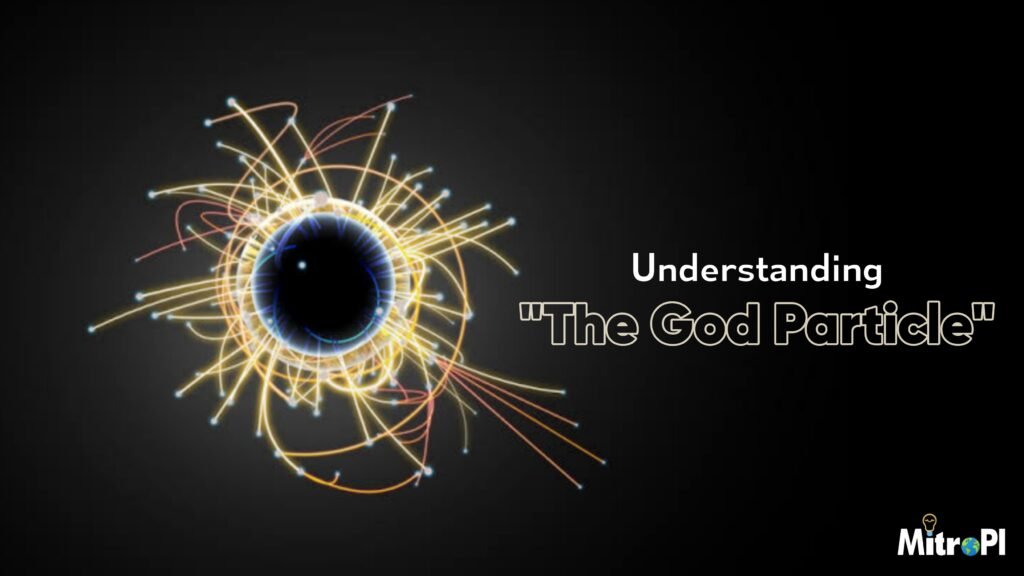The term “God Particle” has become somewhat of a buzzword in both circles and popular culture, evoking curiosity and fascination. But what exactly does it mean? In post, we’ll delve the mysteries of the Higgs boson, often referred to as the God, exploring its significance in physics, its historical context, and its implications for our understanding of the universe.

What is the God Particle?
Definition and Significance in Physics
The God Particle is a nickname for the Higgs boson, a fundamental particle in the universe. Its significance lies in its role within the framework of particle physics, particularly in providing an understanding of how other particles acquire mass. Without the Higgs boson, the universe might be a very different place—one where atoms couldn’t form, and, as a result, life as we know it would not exist.
Why it is Referred to as the “God Particle”
The term “God Particle” was popularized by physicist Leon Lederman, who wanted a catchy title for his book. It’s a bit misleading, though, since it implies a divine quality that doesn’t quite capture the essence of what the Higgs boson represents. Nonetheless, the name stuck, highlighting the particle’s monumental importance in explaining the universe’s structure.
Historical Context
The Origin of the Term and Its Popularization
The phrase “God Particle” became widely known after the publication of Lederman’s book “The God Particle: If the Universe Is the Answer, What Is the Question?” in 1993. Although intended to grab attention, many in the scientific community prefer to refer to it simply as the Higgs boson.
Key Figures in Its Discovery, Including Peter Higgs
The development of the theory around the Higgs boson was first proposed by several scientists, including Peter Higgs, in the 1960s. Higgs, along with others, theorized the existence of a field that gives mass to particles, paving the way for the eventual discovery of the particle itself. It’s remarkable to think about how one idea can shape the future of science!
Basics of Particle Physics
Overview of Fundamental Particles in the Universe
At the heart of particle physics lie fundamental particles, which are the building blocks of all matter. These include quarks, leptons, and bosons. The Higgs boson is part of a group of particles called bosons, which are responsible for mediating forces between other particles.
The Role of the Standard Model in Particle Physics
The Standard Model of particle physics is a well-established theory describing the fundamental particles and their interactions, except for gravity. The introduction of the Higgs boson was a crucial piece that helped confirm this model, filling in gaps that scientists had puzzled over for decades.
Theoretical Foundations
The Role of the Higgs Field
At its core, the Higgs boson arises from the Higgs field, which permeates the entire universe. Think of it as a kind of cosmic molasses that interacts with particles. Particles that interact with this field gain mass, while those that do not remain massless and move at the speed of light.
Mass Generation Mechanism
The Higgs boson plays a central role in the mass generation mechanism described by the Higgs mechanism. Essentially, these particles gain mass through their interactions with the Higgs field; it’s like getting stuck in mud. This mass is crucial for the universe’s overall structure, influencing everything from the formation of stars to the behavior of galaxies.
Predictions and Early Research
Before the Higgs boson was discovered, various theoretical predictions and models suggested its existence. Scientists conducted numerous experiments and simulations, gradually building a case for its existence through many years of dedicated research.
The Search for the Higgs Boson
Large Hadron Collider (LHC)
The Large Hadron Collider (LHC), located at CERN in Switzerland, is essentially the world’s largest particle accelerator. It was built with the primary goal of discovering the Higgs boson by smashing particles together at incredibly high speeds, mimicking conditions just after the Big Bang.
Key Experiments and Milestones
International collaborations among scientists led to several significant experiments at the LHC. The ATLAS and CMS collaborations were particularly noteworthy, employing advanced techniques to analyze collision data in search of the elusive Higgs boson.
Discovery Announcement
On July 4, 2012, scientists at CERN announced the discovery of a particle consistent with the Higgs boson. The excitement that surrounded this announcement was palpable, with cheers erupting in labs worldwide. It was a monumental moment in physics, celebrated not just for what it meant but for the collaborative spirit that made it possible.
Implications of the God Particle
Impact on the Standard Model of Particle Physics
The discovery of the Higgs boson provided much-needed validation of the Standard Model. By confirming the existence of the particle that gives mass, scientists solidified their understanding of fundamental forces and interactions in the universe.
Influence on Cosmology and the Universe
The Higgs boson also plays a role in cosmology, influencing the evolution and expansion of the universe. It has connections to dark matter and dark energy, two of the most mysterious components of our cosmos. Understanding thegs might provide insights into these enigmatic forces.
Future Research Directions
Even with the discovery of the Higgs boson, many questions remain. Scientists are eager to explore the gaps in our knowledge and seek out new particles and phenomena. Future experiments at the LHC and other facilities could unveil answers we’ve yet to imagine.
Myst and Misconceptions
Common Misunderstandings
Many people think the “God Particle” implies a divine aspect to the Higgs boson, but it’s more about the particle’s fundamental importance in physics. It’s essential to distinguish the Higgs boson from other particles, each with its specific role and characteristics.
Controversies and Challenges
The scientific community has not been without debate regarding the implications of the Higgs boson. Questions its properties and the nature of mass continue to fuel discussions. Additionally, the public perception of such complex topics sometimes leads to misunderstandings, emphasizing the need for clearer communication.
Future Questions and Explorations
The story of the Higgs boson is far from over. Scientists are continually investigating what lies beyond the Standard Model, questioning everything from the nature of mass to new theories that could reshape our understanding of the universe.
Conclusion
The discovery the Higgs boson—affectionately dubbed the God Particle—marks a pivotal moment in the journey of understanding our universe. It invites us all to ponder the intricate dance of particles and forces that shape everything around us. The exploration of the Higgs boson and its implications will undoubtedly continue to unfold in the years to come, reminding us of the extraordinary complexity and beauty of the cosmos.
FAQs
What is the significance of the Higgs boson in physics?
The Higgs boson is crucial because it helps explain how particles acquire mass, influencing the fundamental structure of the universe.
How was the Higgs boson discovered?
The Higgs boson was discovered through experiments at the Large Hadron Collider (LHC), where scientists collided particles at high energy, leading to the detection of a particle consistent with the Higgs boson.
What are the implications of the Higgs boson for future research?
The Higgs boson prompts further exploration into theoretical gaps, new particles, and deeper understanding of unanswered questions in physics and cosmology.
Are there any ongoing experiments related to the God Particle?
Yes, researchers continue to conduct experiments at the LHC and other facilities to explore the Higgs boson properties and seek new phenomena.
What does the term “God Particle” actually mean?
The term “God Particle” refers to the Higgs boson, highlighting its importance in understanding mass and the structure of the universe, rather than any divine implication.


